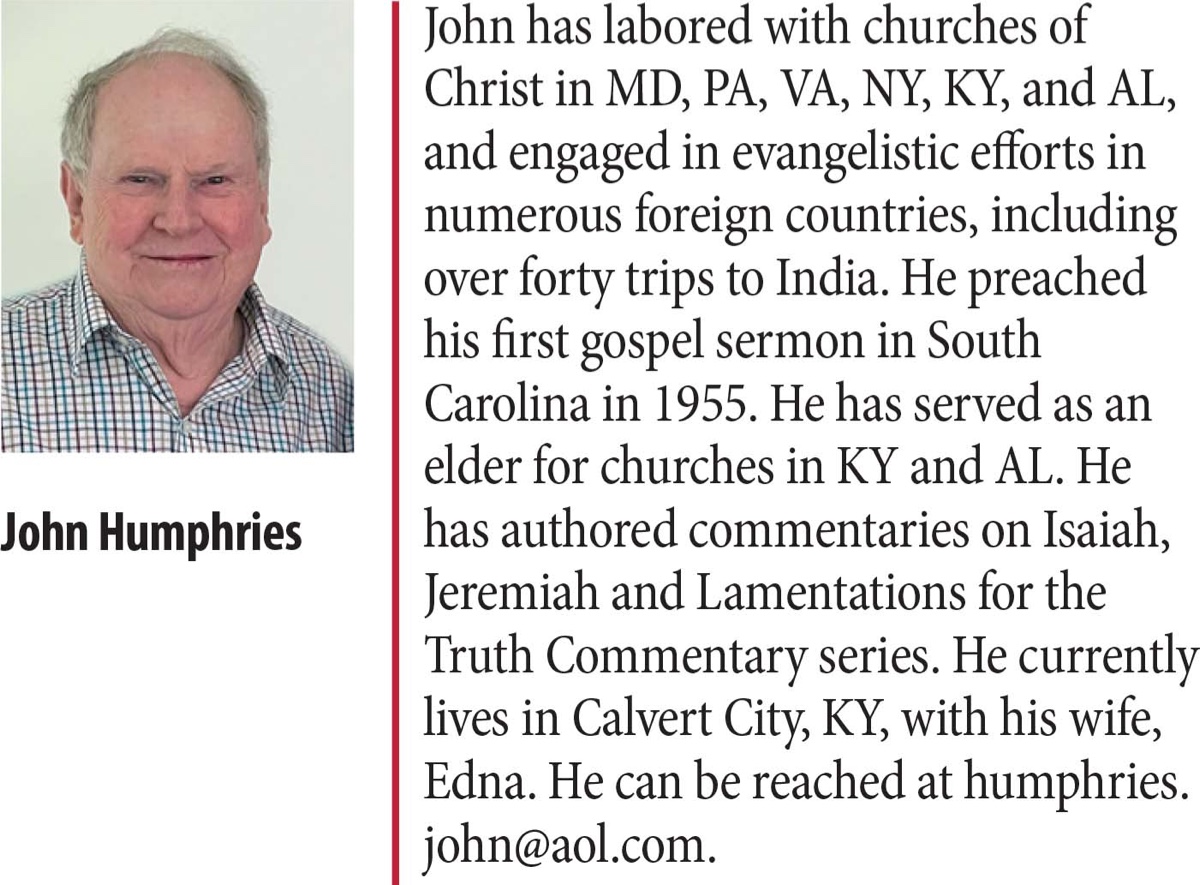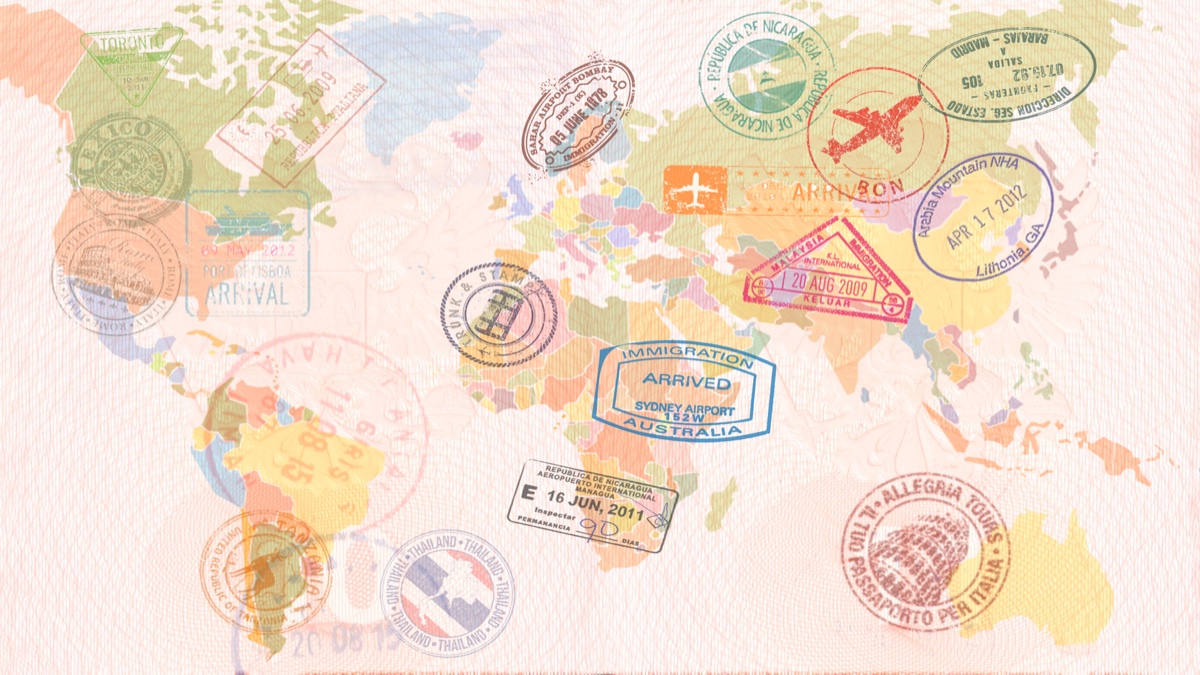by John Humphries
Synopsis: Drawing upon a lifetime of experience, John offers insights on the benefits and blessings of foreign evangelism, along with potential perils and pitfalls.
The Lord commanded that the gospel be preached to all the nations (Matt. 28:18-20; Mark 16:15-16; Luke 24:47; Acts 1:8). While this command was given to the apostles, it did not end there. Those baptized were to be taught what the Lord had commanded the apostles (Matt. 28:20). “Go therefore” with the gospel is the Lord’s will for His people. The Bible indeed abounds with additional exhortations and examples that “all nations” are to be taught the gospel (Act 8:4; 11:19-21; 1 Thess. 1:8; Col. 4:2-6; 2 Pet. 3:15; Rom. 16:3-12). God’s people should use every door of opportunity for teaching the gospel (Col. 4:1-6; Rev. 3:8; 2 Thess. 3:1). The Book of Acts records the spreading of the gospel by those who carried the message, and those who sent them forth to preach and teach (Acts 13:1-3; 14:26-27). In the church at Antioch, there were “prophets and teachers” who carried on the preaching and teaching after Barnabas and Saul departed to preach the gospel in foreign lands.
Following the example of the church at Antioch, brethren who are able need to travel to foreign lands in order to teach the lost. There are several considerations (and suggestions) before going to foreign lands with the gospel. We will present these in no particular order of importance. Some may be more significant than others, depending upon which country one is targeting for gospel work. Some considerations also depend upon the length of stay.
Prayer is essential to beseech the Lord for wisdom and His blessings in going overseas to preach the gospel (Jas. 1:5; Eph. 6:18-20; Col. 4:2-6; 2 Thess. 3:1-2).
I strongly suggested that folks read all that they can get their hands on concerning the history, culture, religion, visa requirements, etc. of the country they wish to visit. The more one knows, the better it may be for a more peaceful visit. Yet, realize that the reading is one thing, but being there may be a different matter. A region in a country may differ from another region in cultural and religious preferences, etc.
There is the matter of contacts within the foreign country. These contacts (brethren or interested souls) are most important as they know the language, culture and can guide or advise one properly. Also, determine that these contacts desire for American brethren to come and preach the gospel among them (cf. Acts 16:9-10).
Correspondence back and forth is vital to set things up. If no one is meeting you at the airport, you may face immediate difficulties, especially if this is the first trip into this foreign land. This quickly becomes complicated by the lack of a translator and someone that can help with transportation and a suitable place to stay. Of course, if you are going overseas with another preacher who has previously visited the country, and has current local contacts, then the above warning does not necessarily apply.
It has also been this writer’s experience to go to a foreign city where there was no church of the Lord and preach Christ on the street corner in English (this was done many years ago in the Philippines where English is widely spoken). Several interested souls heard the truth and were baptized into Christ, thus starting a small church in that city. Yet, this may not always work if there is a language problem where an interpreter is essential.
Once an understanding of a gospel visit to the foreign land is established, and the brethren and family are committed to the endeavor, there is the need to raise financial support for the effort. One must carefully consider the cost of airplane tickets, the cost of a passport, the necessity of obtaining a visa (which may or may not be required), the cost of in-country transportation, food, lodging, and any contingency monies needed, not only to preach, but also to teach Bible classes if such be arranged (1 Cor. 9:7; Phil. 1:5; 2:25; 4:15-16; 2 Tim. 2:2).
Proper clothing (depending upon the country, the time of the year, etc.) and needful toiletries should be taken. Good walking shoes (and possibly a hat for tropical countries) are important. A good flashlight may come in handy. Don’t forget pictures that can be used in giving reports on the trip. Getting into acceptable physical shape may also be helpful. One may need to do a lot of walking in a foreign land. If one has serious health issues, he may need to discuss this with his doctor before going into a third world country where medical treatment is not always available.
If someone has visited this foreign country, it would be wise to speak at length with them. They could be a useful source of information to help make the trip a lot easier. This is especially true if one is planning to stay in a foreign country for several years.
Many countries will not allow extended visits. They will only permit a visit of several weeks or a few months. Longer stays require a different visa than a visitor or tourist visa. One must check on the visa details.
Once on the ground in the foreign land, there are matters of importance to keep in mind. If you are with a fellow preacher that has been there before, or a contact that has met you at the airport, then follow their guide in matters of food, water, money exchange, and culture. This is important because in many countries, drinking local water can make one very ill. Usually today, bottled water is available. That is the safe drink to have around the world. Food that has been cooked and served in clean containers is safer to consume. Wash hands with soap and water as often as possible. Common sense is essential to help avoid having intestinal problems! Believe me, you don’t want to suffer with this when you are thousands of miles from home!
If one has a friendly doctor in the United States, then inform him of your plans to go to a foreign country and request a prescription for an antibiotic to take with you. If you get an infection, that will come in handy. Personal care physicians or travel medicine clinics can also make recommendations for any vaccinations or boosters that may be needed.
For communications, there are inexpensive phones and minutes overseas that can be purchased to stay in touch with home. Today, international phone plans are readily available. Some countries have computer cafes where one may access the internet.
Concerning the culture of a foreign land, please follow guidance offered by the local contact. As long as someone is not trying to get you to violate Scripture or your conscience, be as flexible as possible. In India, it would be insulting for a visitor to refuse hot tea (an important local custom) presented for refreshment. Even if one hates hot tea, it is passable good manners to at least take the tea cup and lightly sip it at least once. Understand the customs in the foreign land and respect them. Remember that you are not in the United States! You are a guest in someone’s country. Don’t be the proverbial “ugly American.” Do not unnecessarily offend the very people that you are trying to teach (1 Cor. 9:22).
Years ago, the 1970s and 80s, when visiting remote villages in India, we stayed in a mud hut with the bathroom consisting of a hole in the ground, a bucket of water, surrounded by walls of banana leaves woven together for modesty. After certain political changes and religious sentiments hardened against non-Hindus, it became unsafe for us to live in the villages with the brethren. Therefore, we determined to meet in the cities and invite the village preachers into the city to meet for a week of intensive day-long studies. They could return to their respective villages and share the Bible teaching with the people. The next week, we would have a different group of preachers with whom we would study. The groups would be from twenty-five to over fifty. In the evening, we would hold gospel preachings in places that afford safe travel.
Some countries are different, and American preachers can travel freely and safely. Nevertheless, it is wise to follow the advice of mature, wise local brethren in planning for preaching and teaching. Even in “safe” countries, there are areas where one should be cautious.
There is the consideration of whether one accepts the native brethren’s invitation to stay in their home or stay in the motels of the foreign country. Certainly, that is up to the American visitor where one will stay. We have done both. It depends upon whether we were making a cross-country trip to be with brethren for preaching and classes. Sometimes it was impractical to stay with brethren on such trips. We would stop for the night and stay in a motel. If we were teaching and preaching in a city for several days, and were invited into the home of brethren, we usually would accept such hospitality. Again, this is entirely up to the American brethren and their particular circumstances.
What native brethren have said is that, when Americans stay in an expensive (to the local brethren) hotel, they feel uncomfortable (as poor villagers) coming into such a place to call upon the Americans who are staying there. Take that into consideration for whatever it may be worth. One might stay in a safe and suitable hotel at night, but schedule Bible studies at another suitable location during the day.
Especially in third world countries, various local preachers will request that we find support for them when we return home. This is understandable, as they see the Americans as having unlimited resources. Some of these brethren may be worthy of support. This places the American preacher in a potentially difficult position. First, with many of the locals, the American preacher has no first-hand knowledge of their work. How can he recommend with full confidence someone that he has known for only a few days in a Bible class? Preachers going overseas need to be prepared to deal with this challenge without being perceived as harsh and uncaring. Sometimes a local preacher that has worked with the American brethren, and is trusted, will have a list of native preachers recommended for support. This is another challenging situation for the visiting American preachers, because it does not involve first-hand information and personal knowledge.
Some American evangelists have exercised questionable judgment, returning to America with a list of foreign preachers for their local congregation or other churches to support, despite possessing little or no first-hand knowledge of these men and their work. Later on, it becomes evident that these local preachers are frauds. Some are very “ecumenical.” Namely, when the Baptists visit from the USA/UK/Canada (or where ever), then they are Baptist, etc. They have different signs for various groups who come to visit.
The suggestion offered is to quietly and gently tell native preachers that their situation may be worthy (and with some, this may be true), but we do not have the funds presently set aside for their support. This is an accurate answer and is as gentle as possible under the circumstances.
Also, native brethren will request funds for a meeting place. Often their building is partially finished and they request funding to complete the structure. I suggested the same answer as above. If the American preacher understands and appreciates the brother and his work, then he must do as he thinks best under the circumstances. However, never make promises you cannot keep.
It is important to remember the commission that Jesus gave in Matthew 28. The Lord said to go and teach all nations, baptize them, and then teach them to obey all His commandments. In other words, the job is not finished at baptism. There must be additional teaching of the converts. This may mean a return trip to the foreign land to teach the baptized disciples the word (Acts 15:36; 2 John 12; 3 John 13-14).
In returning to the same foreign land to preach and teach, one can become more effective in dealing with the cultural and religious challenges that face foreigners. This is one advantage in targeting a particular country and continue working there.
Some faithful brethren have devoted themselves to full-time overseas teaching. These capable, knowledgeable teachers visit brethren in different countries in order to encourage them in the gospel—despite difficult and discouraging circumstances (2 Cor. 1:3-4). When opportunities present themselves, they preach the gospel to unbelievers as well. They perform a valuable service for the cause of Christ.
Brethren in the United States frequently receive emails/letters/messages from individuals living in foreign countries. The writer claims to be an evangelist in need of financial assistance. They report on their work and accomplishments. They make an emotional appeal using words and pictures. Brethren with good intentions will send funds without attempting to verify the information. Apart from a trustworthy recommendation from someone who has direct and personal knowledge of his work, this is a mistake. The emails may be from someone who is neither a gospel preacher nor even a Christian. There are many charlatans parading as “minister of light” (2 Cor. 11:12-15). They are frauds using the internet to bilk money out of brethren. Before responding to these appeals from overseas, brethren should always contact someone who goes to that part of the world and ask about the person claiming to be a gospel preacher (1 John 4:1).
Then Jesus went about all the cities and villages, teaching in their synagogues, preaching the gospel of the kingdom, and healing every sickness and every disease among the people. But when He saw the multitudes, He was moved with compassion for them, because they were weary and scattered, like sheep having no shepherd. Then He said to His disciples, “The harvest truly is plentiful, but the laborers are few. Therefore, pray the Lord of the harvest to send out laborers into His harvest” (Matt. 9:35-38).
By John Humphries
In the beginning, the Word was there.
Through Him, the worlds were made;
But man rebelled, sin’s everywhere,
Deception—the devil’s trade!
Yet God did plan to save us all;
The good news is made known;
But we must heed this gospel call,
Or in vain, the seed is sown!
Christ shed His blood, it stained the sod.
Now a crown adorns His brow;
The world ignores the Son of God,
But he reigns in heaven now!
God loved us so; He gave the best
For all mankind on earth;
Through Christ the lost may find sweet rest;
We must proclaim His worth!
Christ is the Way, there is no other;
The sinner’s only plea.
The gospel makes us all one brother
With those across the sea!
With precious souls, eternity bound,
There is no time to waste.
The final trumpet soon may sound,
So now we must make haste!
Some cannot go, but they can send.
There’s work to do for all;
Support and prayers, our efforts blend.
Ring out the gospel’s call!
We love the Lord, our neighbor too,
And sincere love will show.
The fields are white, the laborers few.
God’s love the lost must know!



